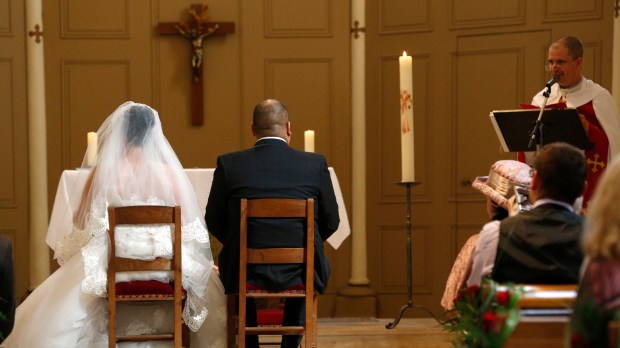Lenten Campaign 2025
This content is free of charge, as are all our articles.
Support us with a donation that is tax-deductible and enable us to continue to reach millions of readers.
Marriage has had a rough few weeks in the news, from Johnny Depp and Amber Heard to the divorce of high-profile religious writer Rod Dreher.
I can’t diagnose their marriages, but with one phrase, Father Hughes Sundeme gave the antidote to 90% of marital problems: “If you cannot forgive, then do not marry,” the priest said at my daughter’s wedding. “When you hear people celebrating 30, 40, 50 years of togetherness, they are celebrating forgiveness.”
Father Sundeme is from Ghana, but is here in Kansas for now, covering several parishes. He shared some of the wisest advice I have ever heard in a wedding homily. Now, I kind of feel like every wedding homily should include it.
First, he said the pain of marriage is the point of marriage.
“Marriage is a ministry of offense,” he said. People laughed uncomfortably so he explained. “God gives us marriage so we can offend each other, and make each other humble and forgiving.”
It took me 30 years to learn that, but it is absolutely true. The flaws and faults of marriage are not an unfortunate occasional obstacle to the real point of marriage, which is peace and harmony; they are the point of marriage. Our flaws and faults destroy each other’s egotism and force us to learn how to love the way Jesus does: sacrificing for imperfect people.
“There will be disagreements, arguments, misunderstanding, hurt feelings and perhaps harsh words,” he said. “These differences can either spoil or destroy your love or strengthen and deepen it. If you quickly reconcile, swiftly heal wounds, your love will soar to a new level and your joy increase.”
Second, he warned the parents that their role in the couple’s marriage is smaller than they think.
“To the parents, a man leaves his father and mother and becomes attached to the wife. Let go of all attachments to your son and daughter,” he said. He got stern, and repeated it firmly: “Advise but do not interfere.”
Absolutely. I’m eternally grateful for the advice my parents and in-laws have gladly given. I’m even more grateful for the advice they withheld. My public-school teacher parents probably doubted the efficacy of my home-schooling ways; they didn’t say so. My tax-expert father-in-law gave very helpful advice, but never insisted or interfered with my “natural financial planning” ways.
We all know examples of how the advice of parents backfires, from sharing thoughts on diapers, to tidiness standards, to how potatoes ought to be cooked.
Third, he warned the congregation that their role in the couple’s marriage is larger than they think.
“To us all, may our presence here help them to grow and not to destroy them,” he said. “We sometimes destroy people’s marriage” by bad witness and bad gossip, he said. “We say, ‘Look at this person. He is married but look at what he is doing!’”
Human beings are hard-wired for community. People imitate what they see. If we are surrounded by positive peer pressure, we get better. If we are surrounded by negative peer pressure, we get worse. Our fidelity to our wedding vows helps those who are not faithful. Our infidelity hurts more than our own family. As the news has shown us, marriage is a public thing, and that makes divorce public, too.
Last, he told them Jesus was sending them like his original disciples.
“When Jesus sent his apostles to proclaim the good news, he sent them two by two,” he said. “You are also sent in two by the sacrament of marriage to preach the gospel, and bear witness with your lives.”
I like that way of thinking about my own marriage: We two, headed out into the great beyond, tiny when compared to the world, but mighty with Christ in the sacrament.
For more, listen to Tom Hoopes’ podcast on “The Ultimate Marriage Advice.”


